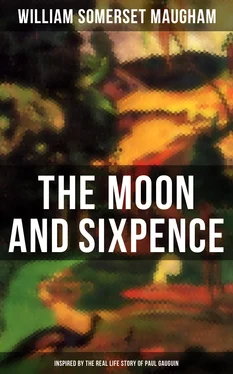But a wise historian is precisely what the Rev. Robert Strickland is not. He wrote his biography [3]avowedly to "remove certain misconceptions which had gained currency" in regard to the later part of his father's life, and which had "caused considerable pain to persons still living." It is obvious that there was much in the commonly received account of Strickland's life to embarrass a respectable family. I have read this work with a good deal of amusement, and upon this I congratulate myself, since it is colourless and dull. Mr. Strickland has drawn the portrait of an excellent husband and father, a man of kindly temper, industrious habits, and moral disposition. The modern clergyman has acquired in his study of the science which I believe is called exegesis an astonishing facility for explaining things away, but the subtlety with which the Rev. Robert Strickland has "interpreted" all the facts in his father's life which a dutiful son might find it inconvenient to remember must surely lead him in the fullness of time to the highest dignities of the Church. I see already his muscular calves encased in the gaiters episcopal. It was a hazardous, though maybe a gallant thing to do, since it is probable that the legend commonly received has had no small share in the growth of Strickland's reputation; for there are many who have been attracted to his art by the detestation in which they held his character or the compassion with which they regarded his death; and the son's well-meaning efforts threw a singular chill upon the father's admirers. It is due to no accident that when one of his most important works, The Woman of Samaria , [4]was sold at Christie's shortly after the discussion which followed the publication of Mr. Strickland's biography, it fetched POUNDS 235 less than it had done nine months before when it was bought by the distinguished collector whose sudden death had brought it once more under the hammer. Perhaps Charles Strickland's power and originality would scarcely have sufficed to turn the scale if the remarkable mythopoeic faculty of mankind had not brushed aside with impatience a story which disappointed all its craving for the extraordinary. And presently Dr. Weitbrecht-Rotholz produced the work which finally set at rest the misgivings of all lovers of art.
Dr. Weitbrecht-Rotholz belongs to that school of historians which believes that human nature is not only about as bad as it can be, but a great deal worse; and certainly the reader is safer of entertainment in their hands than in those of the writers who take a malicious pleasure in representing the great figures of romance as patterns of the domestic virtues. For my part, I should be sorry to think that there was nothing between Anthony and Cleopatra but an economic situation; and it will require a great deal more evidence than is ever likely to be available, thank God, to persuade me that Tiberius was as blameless a monarch as King George V. Dr. Weitbrecht-Rotholz has dealt in such terms with the Rev. Robert Strickland's innocent biography that it is difficult to avoid feeling a certain sympathy for the unlucky parson. His decent reticence is branded as hypocrisy, his circumlocutions are roundly called lies, and his silence is vilified as treachery. And on the strength of peccadillos, reprehensible in an author, but excusable in a son, the Anglo-Saxon race is accused of prudishness, humbug, pretentiousness, deceit, cunning, and bad cooking. Personally I think it was rash of Mr. Strickland, in refuting the account which had gained belief of a certain "unpleasantness" between his father and mother, to state that Charles Strickland in a letter written from Paris had described her as "an excellent woman," since Dr. Weitbrecht-Rotholz was able to print the letter in facsimile, and it appears that the passage referred to ran in fact as follows: God damn my wife. She is an excellent woman. I wish she was in hell. It is not thus that the Church in its great days dealt with evidence that was unwelcome.
Dr. Weitbrecht-Rotholz was an enthusiastic admirer of Charles Strickland, and there was no danger that he would whitewash him. He had an unerring eye for the despicable motive in actions that had all the appearance of innocence. He was a psycho-pathologist, as well as a student of art, and the subconscious had few secrets from him. No mystic ever saw deeper meaning in common things. The mystic sees the ineffable, and the psycho-pathologist the unspeakable. There is a singular fascination in watching the eagerness with which the learned author ferrets out every circumstance which may throw discredit on his hero. His heart warms to him when he can bring forward some example of cruelty or meanness, and he exults like an inquisitor at the auto da fe of an heretic when with some forgotten story he can confound the filial piety of the Rev. Robert Strickland. His industry has been amazing. Nothing has been too small to escape him, and you may be sure that if Charles Strickland left a laundry bill unpaid it will be given you in extenso , and if he forebore to return a borrowed half-crown no detail of the transaction will be omitted.
[1]"A Modern Artist: Notes on the Work of Charles Strickland," by Edward Leggatt, A.R.H.A. Martin Secker, 1917.
[2]"Karl Strickland: sein Leben und seine Kunst," by Hugo Weitbrecht-Rotholz, Ph.D. Schwingel und Hanisch. Leipzig, 1914.
[3]"Strickland: The Man and His Work," by his son, Robert Strickland. Wm. Heinemann, 1913.
[4]This was described in Christie's catalogue as follows: "A nude woman, a native of the Society Islands, is lying on the ground beside a brook. Behind is a tropical Landscape with palm-trees, bananas, etc. 60 in. x 48 in."
Table of Contents
When so much has been written about Charles Strickland, it may seem unnecessary that I should write more. A painter's monument is his work. It is true I knew him more intimately than most: I met him first before ever he became a painter, and I saw him not infrequently during the difficult years he spent in Paris; but I do not suppose I should ever have set down my recollections if the hazards of the war had not taken me to Tahiti. There, as is notorious, he spent the last years of his life; and there I came across persons who were familiar with him. I find myself in a position to throw light on just that part of his tragic career which has remained most obscure. If they who believe in Strickland's greatness are right, the personal narratives of such as knew him in the flesh can hardly be superfluous. What would we not give for the reminiscences of someone who had been as intimately acquainted with El Greco as I was with Strickland?
But I seek refuge in no such excuses. I forget who it was that recommended men for their soul's good to do each day two things they disliked: it was a wise man, and it is a precept that I have followed scrupulously; for every day I have got up and I have gone to bed. But there is in my nature a strain of asceticism, and I have subjected my flesh each week to a more severe mortification. I have never failed to read the Literary Supplement of The Times. It is a salutary discipline to consider the vast number of books that are written, the fair hopes with which their authors see them published, and the fate which awaits them. What chance is there that any book will make its way among that multitude? And the successful books are but the successes of a season. Heaven knows what pains the author has been at, what bitter experiences he has endured and what heartache suffered, to give some chance reader a few hours' relaxation or to while away the tedium of a journey. And if I may judge from the reviews, many of these books are well and carefully written; much thought has gone to their composition; to some even has been given the anxious labour of a lifetime. The moral I draw is that the writer should seek his reward in the pleasure of his work and in release from the burden of his thought; and, indifferent to aught else, care nothing for praise or censure, failure or success.
Читать дальше









![John Bruce - The Lettsomian Lectures on Diseases and Disorders of the Heart and Arteries in Middle and Advanced Life [1900-1901]](/books/749387/john-bruce-the-lettsomian-lectures-on-diseases-and-disorders-of-the-heart-and-arteries-in-middle-and-advanced-life-1900-1901-thumb.webp)

